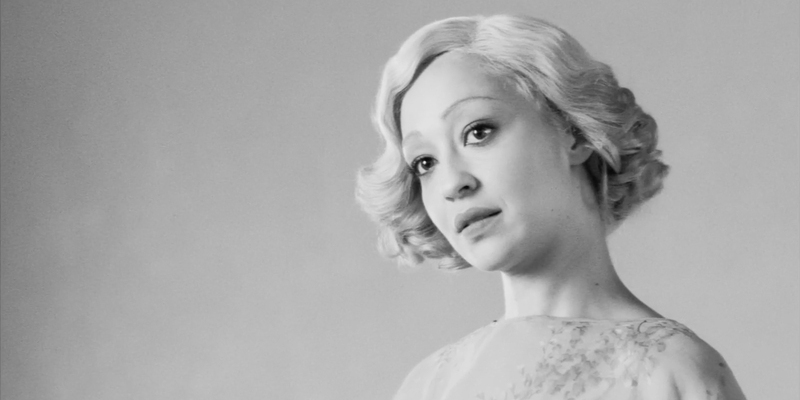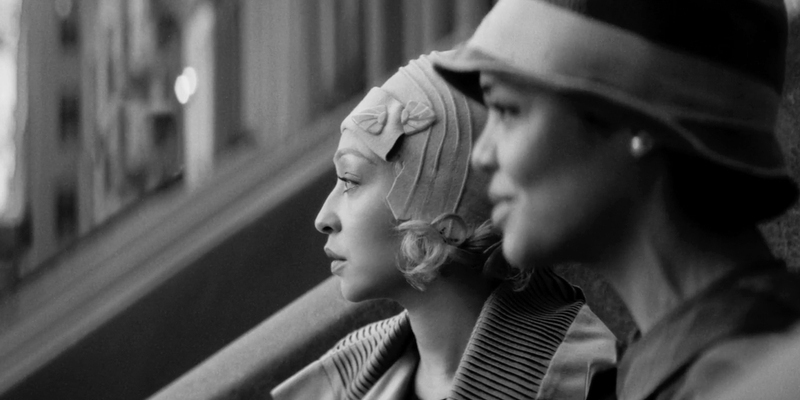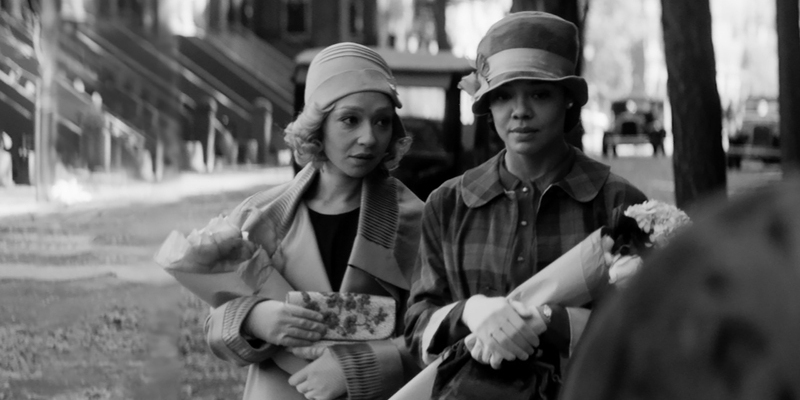
Review by
Eric Hillis
Directed by: Rebecca Hall
Starring: Tessa Thompson, Ruth Negga, André Holland, Bill Camp, Gbenga Akinnagbe, Antoinette Crowe-Legacy,
Alexander Skarsgård

While today you're arguably more likely to hear of white people trying
to pass themselves off as black, for most of America's history the
opposite was true. For obvious reasons, there was a time when mixed-race
or light-skinned African-Americans would indulge in "passing", the
practice of passing themselves off as fully Caucasian. The idea fuelled
such literary works as Nella Larsen's 1929 novel 'Passing' and
Fannie Hurst's 1933 book 'Imitation of Life'. The latter would be filmed
a year later by director John M. Stahl, bringing its racial theme to the
screen just before the Hays code put an end to such explorations.
Stahl's film starred Fredi Washington in the role of a young mixed-race
woman who passes herself off as white. Many cinema-goers of the era were
said to be shocked to learn that Washington was partly African-American,
though she never denied her heritage, an act that likely cost her
greater stardom.
In its best moments, Rebecca Hall's directorial debut, an
adaptation of Larsen's novel, plays like some lost pre-code movie from
the early 1930s. It's played with the subtlety of an earlier age. It's a
movie that carries a tissue clenched in its hand, lest it reveal its
emotions. Unlike most modern movies that deal with the thorny issue of
race relations, it keeps its cards close to its chest, much like its
protagonists.

We meet our protagonist, Tessa Thompson's Irene "Reenie"
Redfield, as she takes a trip outside her comfort zone of Harlem to
mingle undetected in lower Manhattan's white society. Keeping her face
covered by a hat lowered over her eyes, Reenie walks through the crowds
like the hero of a zombie movie shuffling in secret among a horde of the
undead. Blagging her way into a hotel's tea room, Reenie finds she's
caught the eye of a "white" woman who stares her down from across the
room. Turns out the woman isn’t white at all but rather Clare Bellew (Ruth Negga), an old school friend of Reenie's. Like Reenie, Clare is mixed race,
but while Reenie has chosen to live in the African-American enclave of
Harlem, Clare has passed herself off as white and married into high
society.
Clare returns to Reenie's life like a whirlwind, sweeping her off her
feet before she has figured out whether she wants to be carried away. A
forceful and determined figure, Clare brags of the life her deception
has brought her, and encourages Reenie to do the same. Reenie almost
seems to be falling for her old friend's undeniable charms, but
charisma's just another word for trouble and Reenie is brought back down
to earth by an encounter with Clare's racist husband (Alexander Skarsgard).

Reenie ignores various correspondences from Clare in the following
months until she turns up at her home one day. As Clare possesses the
sort of personality that doesn't allow for easy dismissal, she quickly
ingratiates herself in the life of Reenie, and that of her doctor
husband Brian (André Holland) and their two kids. Everyone around
Reenie is initially suspicious of Clare, whom Reenie defends, but as
Clare reels them in with her charms, it's Reenie who becomes
increasingly troubled by her presence. Initially dismissive of Clare's
decision to live a life of deception, Reenie seems to reevaluate the
life she keeps telling herself, and anyone else who will listen, she's
content with. And content she should be. By anyone's standards she seems
to have it made, and compared to the average African-American of the
1930s she might as well be royalty. But food always seems to taste
better when you take it from your fellow diner's plate, doesn't
it?
Passing is a surprisingly cinematic directorial debut for
an actor. Hall uses her limited budget wisely, perhaps even benefitting
from a necessity for economical storytelling. It's refreshing that here
is a film where nobody tells us what they're really feeling, that forces
the viewer to read between the lines, to study the faces of its
characters for glimpses of the truth. We learn Reenie's true feelings by
the way she studies her reflection, how she stands on the edges of
social gatherings, how she treats her maid with increasing coldness.
Hall repeats the image of Reenie walking home on her middle class Harlem
street, and this serves to both show the passing of time and the
drudgery of Reenie's "contentment." Clare is more difficult to read. Her
whole life seems an act, and the inability to figure out who she really
is frustrates the audience as much as it does Reenie.

Along with telling her story in confident visual terms, Hall has mined
a pair of equally stunning, but very different performances from her
leading ladies. Afforded the showier role, Negga will likely receive the
plaudits she deserves – it's a firecracker of a turn, one that recalls
the charisma of the great actresses of the pre-code era, Stanwyck,
Blondell, Hopkins et al. Thompson's subtler work may be easier to
overlook, but to do so would be to miss one of the performances of the
year. I'm not sure if we've been taking Thompson for granted or she just
hasn't gotten the roles she deserves (likely a little of both), but I
can't recall her ever being this quietly mesmeric.
Hall has made a very good movie in Passing, but I'm not sure if she's made a very good about "passing."
Certainly, the 1934 version of Imitation of Life has more
to say on the subject. Clare's passing only really figures into the
opening and climax of the film. For the rest of the picture it might
just have been a story of a woman who grows jealous of their friend's
perceived superior social status and could have starred two white
actresses with little alteration. Given Hall's own family background
(her mother is the mixed-race opera singer Maria Ewing), this is an
unexpected quibble.

Passing is in UK/ROI cinemas
from October 29th and on Netflix from November 10th.

